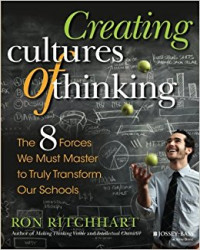


Text
Creating cultures of thinking :the 8 forces we must master to truly transform our schools
"Discover why and how schools must become places where thinking is valued, visible, and actively promoted. As educators, parents, and citizens, we must settle for nothing less than environments that bring out the best in people, take learning to the next level, allow for great discoveries, and propel both the individual and the group forward into a lifetime of learning. This is something all teachers want and all students deserve. In Creating Cultures of Thinking: The 8 Forces We Must Master to Truly Transform Our Schools, Ron Ritchhart, author of Making Thinking Visible, explains how creating a culture of thinking is more important to learning than any particular curriculum and he outlines how any school or teacher can accomplish this by leveraging 8 cultural forces: expectations, language, time, modeling, opportunities, routines, interactions, and environment. With the techniques and rich classroom vignettes throughout this book, Ritchhart shows that creating a culture of thinking is not about just adhering to a particular set of practices or a general expectation that people should be involved in thinking. A culture of thinking produces the feelings, energy, and even joy that can propel learning forward and motivate us to do what at times can be hard and challenging mental work"--; Provided by publisher.; Includes bibliographical references and indexes.; Machine generated contents note: List of Tables and Figures Acknowledgments About the Author Introduction: Demystifying Group and Organizational Culture A New Standard for Education The Forces that Shape Culture Tools for Transformation Chapter 1. The Purpose and Promise of Schools Thinking Differently about Outcomes Teaching as Enculturation Culture as the Enactment of a Story Uncovering the Old Story Taking a Hard Look at the Current Story Crafting a Different Story for Schools Enacting Our New Story, Realizing Our Vision Uncovering the Story of Your School or Classroom Chapter 2. Expectations: Recognizing How Our Beliefs Shape Our Behavior Focusing Students on the Learning vs. the Work Teaching for Understanding vs. Knowledge Encouraging Deep vs. Surface Learning Strategies Encouraging Independence vs. Dependence Developing a Growth vs. a Fixed Mindset Exploring and Developing Expectations Chapter 3. Language: Appreciating Its Subtle Yet Profound Power The Language of Thinking The Language of Community The Language of Identity The Language of Initiative The Language of Mindfulness The Language of Praise and Feedback Conclusion Becoming Proficient Users of the Languages of the Classroom Chapter 4. Time: Learning to Be Its Master Rather than Its Victim Recognizing Time as a Statement of Values Learn to Prioritize and Always Prioritize Learning Giving Thinking Time Invest Time to Make Time Manage Energy Not Time It's Time to Rethink Time Rethinking Time Chapter 5. Modeling: Seeing Ourselves through Our Students' Eyes Dispositional Apprenticeship: Being Role Models of Learning and Thinking Cognitive Apprenticeship: Making Our Thinking Visible Gradual Release of Responsibility: Modeling for Independence Interactive Modeling: Learning from Examples, Practice, and Reflection Learning from Models Modeling for the Development of Thinking, Learning, and Independence Chapter 6. Opportunities: Crafting the Vehicles for Learning Constructing Character: Using Mathematics to Understand Othello's Iago VoiceThread: Using Story Telling to Understand Migration Music 2 Save Music Categorizing, Recognizing, and Realizing Learning Opportunities Analyzing and Creating Opportunities for Learning Chapter 7. Routines: Crafting the Vehicles for Learning A Routine Is More than an Activity Using Claim-Support-Question to Delve into Number Theory in Fifth Grade More Than a Game: Differentiating Mathematics in Second Grade Making CSQ Fly in Secondary Mathematics Tools, Structures, and Patterns: Establishing Routines in the Classroom Making Thinking Routine in Our Classrooms Chapter 8. Interactions: Forging Relationships that Empower Learners New Roles for Students: Empowering Disenfranchised Learners Beyond Sit and Get: Teaching Students to Build on One Another's Ideas Building Culture through Affect and Actions Shaping Interactions through Roles Asking "Good" Questions Creating New Patterns of Discourse Promoting Interactions that Support Thinking and Learning Chapter 9. Environment: Using Space to Support Learning and Thinking New Learning in an Old Container Curating a Classroom Designing for Thinking Creating Environments to Enhance Learning and Build Culture: Four Fronts Creating Environments that Bring Out the Best in Learners Chapter 10. Moving Toward Transformation Supporting Change on a Large Scale Building a Vision across a School District Learning Together for the Long Haul Creating Opportunities Building the Capacity of Teachers to Teach One Another Forming Inquiry Action Groups to Go Deeper Sameness and Difference in the Journey to a Culture of Thinking Appendix A. My Reflections on the Learning Activities in this Class Appendix B. Ladder of Feedback Appendix C. Success Analysis Protocol Appendix D. Looking at Students' Thinking Protocol Appendix E. Six Key Principles of the Cultures of Thinking Project Appendix F. Laying the Foundation for a Culture of Thinking Appendix G. Leading a Culture of Thinking at My School: Self-Assessment Appendix H. The Development of a Culture of Thinking in My Classroom: Self-Assessment Appendix I. Assessment Ladder: Reasoning With Evidence References Index .;
Ketersediaan
Tidak ada salinan data
Informasi Detail
- Judul Seri
-
-
- No. Panggil
-
370.152 RIT c
- Penerbit
- San Francisco : Graffiti Pers., 2015
- Deskripsi Fisik
-
xiv, 367 pages ; 24 cm
- Bahasa
-
English
- ISBN/ISSN
-
9781118974605 (paper
- Klasifikasi
-
370.152
- Tipe Isi
-
-
- Tipe Media
-
-
- Tipe Pembawa
-
-
- Edisi
-
-
- Subjek
- Info Detail Spesifik
-
-
- Pernyataan Tanggungjawab
-
Ron Ritchhart.
Versi lain/terkait
Tidak tersedia versi lain
Lampiran Berkas
Komentar
Anda harus masuk sebelum memberikan komentar